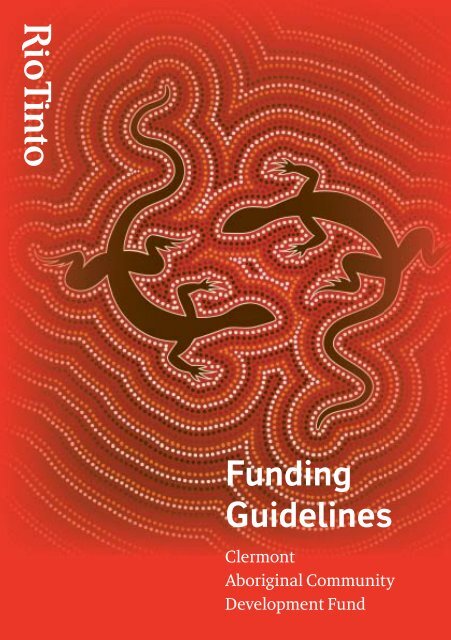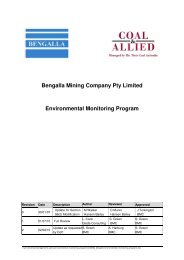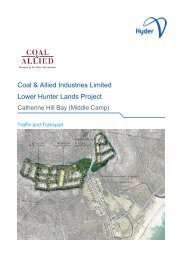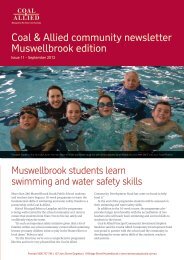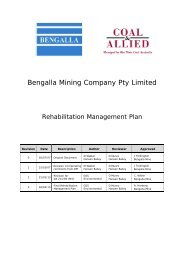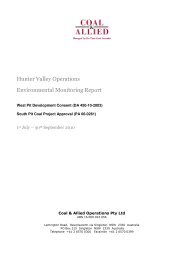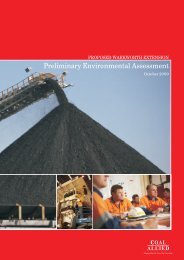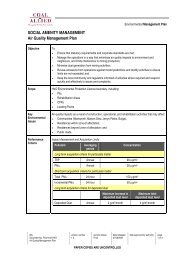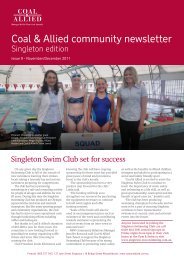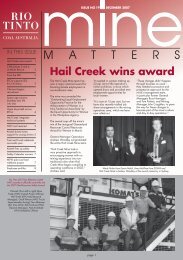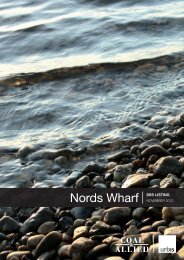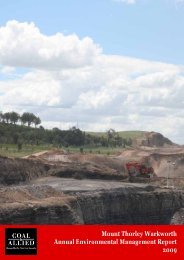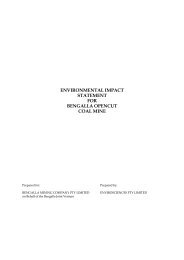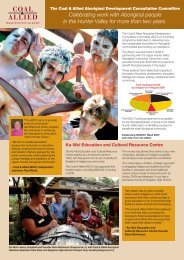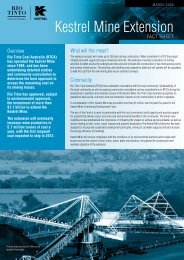Clermont Aboriginal Community Development Fund guidelines
Clermont Aboriginal Community Development Fund guidelines
Clermont Aboriginal Community Development Fund guidelines
You also want an ePaper? Increase the reach of your titles
YUMPU automatically turns print PDFs into web optimized ePapers that Google loves.
<strong>Fund</strong>ing<br />
Guidelines<br />
<strong>Clermont</strong><br />
<strong>Aboriginal</strong> <strong>Community</strong><br />
<strong>Development</strong> <strong>Fund</strong>
Rio Tinto Coal Australia<br />
Pty Limited (RTCA)<br />
operates the Blair Athol<br />
and <strong>Clermont</strong> mines<br />
within the area of the<br />
Wangan & Jagalingou<br />
Native Title Claim.
01<br />
Guidelines<br />
RTCA has held a series of meetings with<br />
representatives of the registered native<br />
title claimants in the Wangan & Jagalingou<br />
Native Title Claim to discuss how it might<br />
be able to work with them in setting up<br />
an arrangement that could develop a<br />
relationship and proceed to an agreement<br />
with the <strong>Aboriginal</strong> interests in and that<br />
can speak for country where RTCA has<br />
mining interests (the Project Area).<br />
In building a relationship with the<br />
Wangan & Jagalingou People, RTCA<br />
seeks to deal with issues specific to the<br />
Wangan & Jagalingou People (such as<br />
cultural heritage and cultural induction<br />
programmes) as well as develop some<br />
programmes and proposals that would<br />
benefit the broader <strong>Aboriginal</strong> community<br />
in the Project Area.<br />
The funding available to the <strong>Aboriginal</strong><br />
<strong>Community</strong> <strong>Development</strong> <strong>Fund</strong> may vary<br />
from year to year and these <strong>guidelines</strong><br />
(Guidelines) have been agreed between<br />
RTCA and the representatives of the<br />
Wangan & Jagalingou People to ensure<br />
the <strong>Aboriginal</strong> <strong>Community</strong> <strong>Development</strong><br />
<strong>Fund</strong> is used in the most effective way<br />
to assist the <strong>Aboriginal</strong> <strong>Community</strong><br />
of Interest achieve their “Vision of the<br />
Future”. The Vision essentially seeks to<br />
achieve equivalent access and outcomes<br />
in education, training, employment<br />
and economic participation as that<br />
enjoyed by the community as a whole as<br />
well as retaining the unique heritage<br />
and traditions of the Wangan &<br />
Jagalingou People.<br />
From these discussions RTCA and<br />
the Wangan & Jagalingou native title<br />
claimants signed an Indigenous Land<br />
Use Agreement (ILUA) in May 2008. This<br />
agreement established an <strong>Aboriginal</strong><br />
<strong>Community</strong> <strong>Development</strong> <strong>Fund</strong> (ACDF)<br />
that provides funds to support community<br />
driven projects that deliver positive,<br />
constructive, real and sustainable<br />
outcomes to the <strong>Aboriginal</strong> <strong>Community</strong><br />
of Interest. The ACDF is administered by<br />
the <strong>Aboriginal</strong> <strong>Community</strong> <strong>Development</strong><br />
<strong>Fund</strong> Committee (ACDFC).
02<br />
Guidelines<br />
The Vision provides a framework for the<br />
ACDFC to consider project proposals.<br />
The ACDFC will consider applications<br />
that seek funding for any of the following<br />
types of projects that take steps towards<br />
achieving the Vision and that meet the<br />
mandatory criteria.<br />
The ACDFC vision and objectives over the<br />
next 20 years are that:<br />
Vision<br />
“<strong>Aboriginal</strong> People enjoy the same prospects<br />
for employment, economic prosperity and<br />
quality of life as other community members.”<br />
Objectives<br />
Capacity Building<br />
“That <strong>Aboriginal</strong> people are able to<br />
participate fully in their community and are<br />
empowered to take greater control of their<br />
health and community wellbeing.”<br />
Education and Training<br />
“That <strong>Aboriginal</strong> children reach educational<br />
outcomes at the same level as the community<br />
average and that there is continual<br />
improvement of the educational, training<br />
and pre-vocational skills and abilities of<br />
<strong>Aboriginal</strong> people living in the region.”<br />
Governance<br />
“That a professional governance structure<br />
and process to enhance effective and efficient<br />
planning and decision-making, leadership,<br />
coordination and monitoring of the <strong>Fund</strong> is<br />
developed and maintained.”<br />
The ACDFC will use the Vision statement<br />
and Objectives as a guide to decide how<br />
it can best support and develop the<br />
<strong>Aboriginal</strong> <strong>Community</strong> of Interest. The<br />
Vision and Objectives forms the basis for<br />
the types of projects that the ACDFC will<br />
support and how it intends to allocate its<br />
funds. This is discussed in more detail in<br />
these <strong>guidelines</strong>.<br />
These Guidelines provide information on:<br />
(a) How to apply for funding; and<br />
(b) How projects will be assessed by the<br />
ACDFC.<br />
The Guidelines will be reviewed by the<br />
ACDFC at regular intervals to ensure that<br />
they are effective and meet the purpose for<br />
which they were established.<br />
Cultural Heritage<br />
“That ancient cultural heritage of the<br />
Wangan Jagalingou people is identified and<br />
preserved for the benefit of current and future<br />
generations.”
03<br />
Contents<br />
Proposals 4<br />
Application Process 6<br />
Mandatory Criteria 6<br />
Additional Criteria 6<br />
<strong>Aboriginal</strong> business development 8<br />
Educational programmes 8<br />
Heritage and culture conservation 8<br />
Training and employment 8<br />
<strong>Community</strong> benefits projects 8<br />
Sporting and community activity 8<br />
Other projects agreed to by the ACDFC 8<br />
The Committee 9<br />
Lodging an Application 9
04<br />
Proposals<br />
An application for<br />
funding from the from the<br />
<strong>Aboriginal</strong> <strong>Community</strong><br />
<strong>Development</strong> <strong>Fund</strong> may<br />
be made to the ACDFC<br />
by any member of the<br />
<strong>Aboriginal</strong> <strong>Community</strong><br />
of Interest or an entity<br />
that proposes a project<br />
specifically for the<br />
benefit of the <strong>Aboriginal</strong><br />
<strong>Community</strong> of Interest.<br />
The <strong>Aboriginal</strong> <strong>Community</strong> of Interest is<br />
comprised of every person who is either:<br />
(a) a member of the Wangan & Jagalingou<br />
Native Title Claim Group; or<br />
(b) able to provide evidence that he or<br />
she is an <strong>Aboriginal</strong> person who has<br />
resided within the area of the Wangan<br />
& Jagalingou Native Title Claim for<br />
more than one year.<br />
Members of the ACDFC have developed a<br />
“Vision for the Future” (the Vision), which<br />
outlines key long term goals in the areas of<br />
education, employment, training, cultural<br />
heritage conservation and enterprise<br />
development. The Vision provides a<br />
framework for the ACDFC to consider<br />
project proposals.
05<br />
Proposals<br />
As a guide, eligible applicants are seen<br />
as those who:<br />
• Can demonstrate they can make<br />
effective use of the funds in<br />
accordance with these Guidelines and<br />
the Vision;<br />
• Are willing and able to measure the<br />
performance of the project; and<br />
• Can work in partnership with the<br />
<strong>Aboriginal</strong> <strong>Community</strong> <strong>Development</strong><br />
<strong>Fund</strong> Committee (ACDFC).<br />
The ACDFC will not consider any<br />
applications for funding for any of the<br />
following matters:<br />
• Native title matters<br />
• Cultural heritage management<br />
matters<br />
• Issues to be dealt with or considered<br />
by legal process
06<br />
Application Process<br />
Applicants for funding must be able to<br />
show that their proposed project will<br />
satisfy the following mandatory criteria:<br />
(a) the project must take steps to<br />
achieving the Vision and deliver<br />
positive, constructive, real outcomes<br />
to the <strong>Aboriginal</strong> <strong>Community</strong> of<br />
Interest;<br />
(b) the project's processes and<br />
management must be sound and<br />
viable (i.e., any idea which is not viable<br />
will not be funded);<br />
(c) the project must have a "multiplier"<br />
effect (i.e., each dollar of funding<br />
must create more than 1 dollar worth<br />
of benefit – e.g., if one person's<br />
employment is funded, the purpose<br />
of such employment must be to create<br />
more employment, not simply to<br />
employ one person);<br />
(d) if the project relates to education,<br />
training or scholarships, there must<br />
be high potential for a consequential<br />
community benefit or for<br />
consequential employment; and<br />
(e) the project's funding through the<br />
ACDFC must not create division in the<br />
<strong>Aboriginal</strong> <strong>Community</strong> of Interest,<br />
within the broader community or with<br />
RTCA.<br />
Applicants should also endeavour to<br />
address, as far as possible, the following<br />
additional criteria about their proposed<br />
project:<br />
(a) Outcomes: how the project’s progress<br />
and outcomes will be measured over<br />
time and how a precise assessment of<br />
the resulting community benefits will<br />
be conducted, including information<br />
on the research to be undertaken to<br />
make such assessments;<br />
(b) Management skills and experience:<br />
the experience and skill of the<br />
applicant relevant to the project<br />
and, for business projects, any<br />
training undertaken by the applicant<br />
in business and/ or business<br />
management, to enable the ACDFC<br />
to assess whether the project will be<br />
well-managed, whether any funding<br />
will be properly used and whether the<br />
proposed project outcomes will be<br />
achieved;<br />
(c) Employment impact: for business<br />
projects, approximately how many<br />
people are likely to be employed in the<br />
business;<br />
(d) <strong>Community</strong> benefit and term: the<br />
nature and extent of benefits to the<br />
<strong>Aboriginal</strong> <strong>Community</strong> of Interest<br />
from the project and how long those<br />
benefits will continue;<br />
(e) Duplication and alternatives:<br />
whether there is an existing similar<br />
project in the region and whether the<br />
benefits from the project will outweigh<br />
the benefits which could result from<br />
other projects seeking funding through<br />
the ACDFC;<br />
(f) Self contributions: whether the<br />
applicants are also contributing<br />
financial or in-kind support to the<br />
project;
(g) Viability research: whether and<br />
what research has been done on the<br />
viability of the project and the project’s<br />
processes and expected outcomes;<br />
(h) Timing: how long the project will seek<br />
to rely on funding through the ACDFC<br />
(because preference will be given to<br />
stand-alone projects requiring only<br />
“one-off” or “seed” funding rather than<br />
those requiring recurrent funding);<br />
(i) Conditions: where the project requires<br />
ongoing funding (which under these<br />
Guidelines can only be provided by<br />
instalments), the conditions which the<br />
applicant is prepared to satisfy before<br />
each instalment becomes payable;<br />
(j) Future maintenance: how the project<br />
will be maintained beyond the period<br />
when funding through the ACDFC is<br />
available;<br />
(k) Effect on other opportunities:<br />
whether the project could harm or<br />
diminish the opportunities for others<br />
in the <strong>Aboriginal</strong> <strong>Community</strong> of<br />
Interest;<br />
(l) Effect on community relations:<br />
whether the project will develop and<br />
strengthen or harm relations between<br />
the members of the <strong>Aboriginal</strong><br />
<strong>Community</strong> of Interest, the broader<br />
community and RTCA;<br />
(m) Commitment to project: whether the<br />
applicant will be actively involved<br />
throughout the whole of the project;<br />
(n) Skills: whether the applicant already<br />
has or is undertaking training to<br />
acquire the skills necessary to ensure<br />
the success of the project or whether<br />
a third party with such skills will be<br />
involved in the project;<br />
(o) Reporting: how the applicant will<br />
report to the ACDFC on his or her<br />
progress on acquiring the skills<br />
necessary to ensure the success of the<br />
project and on achievement of key<br />
milestones and outcomes;<br />
(p) <strong>Community</strong> need: whether there is a<br />
specific unmet community need that<br />
the project will meet;<br />
(q) Other sources of funding: whether<br />
there is government or other funding<br />
already available for the project;<br />
(r) Previous ACDF <strong>Fund</strong>ing: whether the<br />
applicant has previously applied to the<br />
ACDF for funding, and if successful, a<br />
brief description of the outcomes and<br />
success of the project;<br />
(s) Support: whether there are any other<br />
groups or sections of the general<br />
community currently supporting the<br />
project;<br />
(t) Repayment: whether the project<br />
contemplates repayment of part or all<br />
of the funding;<br />
(u) Attendance at ACDF meeting:<br />
whether the applicant, at the<br />
applicant’s own cost and expense, can,<br />
if invited by the ACDFC, attend and<br />
address the members of the ACDFC<br />
on aspects of the application prior to<br />
the member’s consideration of the<br />
application, or after approval of the<br />
project, to report on outcomes; and<br />
(v) Other: whether and what other<br />
information is available about the<br />
project that the ACDFC may find<br />
useful in making a decision.<br />
07<br />
Application Process
08<br />
Application Process<br />
<strong>Fund</strong>ing may be provided for projects that<br />
will assist to achieve the “Vision for the<br />
Future”. Examples are given below.<br />
<strong>Aboriginal</strong> business development<br />
• <strong>Fund</strong>ing a business plan or feasibility<br />
study to establish a business<br />
• <strong>Fund</strong>ing business training<br />
• <strong>Fund</strong>ing professional advice as<br />
appropriate<br />
• Joint ventures between <strong>Aboriginal</strong><br />
businesses and other businesses<br />
Educational programmes<br />
• Assistance to undertake further<br />
educational opportunities at<br />
secondary school<br />
• Assistance to undertake tertiary<br />
educational programmes<br />
Heritage and culture conservation<br />
• Language revival and preservation<br />
programmes<br />
• Children’s cultural events<br />
• Educational programmes (e.g. for local<br />
schools)<br />
• Research programmes (e.g. ethnohistory<br />
work)<br />
• Programmes to update historical<br />
references<br />
• <strong>Development</strong> and promotion of<br />
culture and cultural understanding<br />
Training and employment<br />
• Assistance in training for jobs<br />
• Assistance in searching for jobs<br />
• Assistance with vocational training or<br />
TAFE<br />
<strong>Community</strong> benefits projects<br />
• Specific projects the community has<br />
not been able to achieve through<br />
government or other funding sources<br />
• Projects that will deliver tangible<br />
benefits for community health and<br />
wellbeing<br />
• Assistance to leverage government or<br />
other funding sources<br />
Sporting and community activity<br />
• Specific grants to individuals whose<br />
specific circumstances require support<br />
• Assistance by way of scholarship for<br />
outstanding young sports people<br />
• Sponsorship of <strong>Aboriginal</strong> role<br />
models to promote sport and sporting<br />
achievement<br />
Other projects agreed to by the ACDFC<br />
• Projects that have compelling and<br />
significant benefit for the whole<br />
<strong>Aboriginal</strong> <strong>Community</strong> of Interest<br />
If you have a project or concept that you<br />
think is appropriate for funding, contact<br />
the Executive Officer to discuss your idea.<br />
If it shows potential, the Executive Officer<br />
can provide assistance to prepare an<br />
application.<br />
In completing the application form,<br />
applicants will need to explain how the<br />
project will meet the aims of the ACDF<br />
and “Vision for the Future”, how they will<br />
measure its success and how the project<br />
will be undertaken.
The Committee<br />
The committee will consider completed<br />
applications at its meetings – scheduled<br />
four times per year. The ACDFC will<br />
comprise six members:<br />
• two members appointed by Wangan &<br />
Jagalingou<br />
• two members appointed by RTCA<br />
• two members nominated to represent<br />
the interests of the broader <strong>Clermont</strong><br />
<strong>Aboriginal</strong> <strong>Community</strong><br />
What form should the application take<br />
and where and when should it be lodged?<br />
Each application for funding should<br />
(excluding funeral expenses):<br />
(a) be made in accordance with the<br />
Application Form that is available<br />
from the Executive Officer;<br />
(b) be submitted to:<br />
The Executive Officer<br />
<strong>Clermont</strong> <strong>Aboriginal</strong> <strong>Community</strong><br />
<strong>Development</strong> <strong>Fund</strong><br />
PO Box 129,<br />
<strong>Clermont</strong> Qld 4721<br />
Email: clermont.acdf@riotinto.com<br />
(c) address the mandatory criteria and<br />
should endeavour to address any<br />
applicable optional criteria listed<br />
above; and<br />
(d) should if practicable be received by the<br />
Executive Officer at least three weeks<br />
prior to the ACDFC meeting at which<br />
the applicant wishes the application<br />
to be considered. The ACDFC will be<br />
meeting quarterly – please contact the<br />
Executive Officer for relevant details.<br />
09<br />
Application Process<br />
Timeframe for consideration of<br />
applications<br />
The ACDFC will endeavour to address<br />
applications in a timely fashion.
Rio Tinto Coal Australia<br />
GPO Box 391<br />
Brisbane QLD 4001<br />
Phone: 07 3361 4200<br />
Fax: 07 3361 4370<br />
Email: info@rtca.riotinto.com.au<br />
© Rio Tinto plc and Rio Tinto Limited


